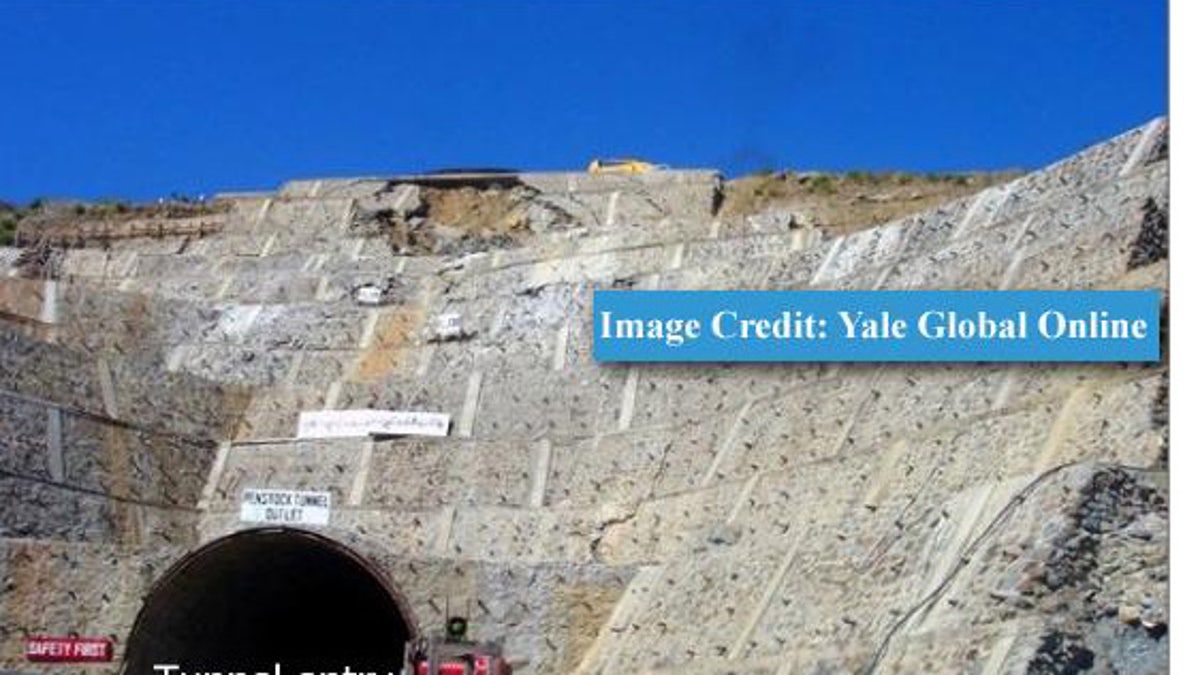
Ground photograph obtained by Bertil Lintner at YaleGlobal Online. ISIS assessed that this photograph depicts a dam penstock. (Yale Global Online)
For the past year, intelligence agencies in the U.S. and Asia have been watching as equipment and machines capable of being used to build nuclear weapons have been flowing into Burma, raising the specter that the isolated and secretive Southeast Asian nation may become the world’s second rogue nuclear power.
Because of the nature of Burma's paranoid and repressive ruling military junta, there is tremendous fear that, if it acquires a nuclear capability, it will set off an arms race that could change the political dynamics of Southeast Asia.
But experts caution that Burma, also called Myanmar, is so closed to the outside world that it is hard to be sure exactly what it is up to – and that makes the situation even worse.
Dissident groups that monitor the insular state say the junta has wide-ranging ambitions to acquire nuclear weapons within the next few years, because the generals who rule the country are mistakenly fearful of an American intervention. With vast wealth from natural resources, dissident groups say, the regime has reopened ties with North Korea. And with Pyongyang's help, they say, Burma is setting up a “vertically integrated” nuclear complex that includes “mines, mill, enrichment facility, and reactor” in the mountainous, sparsely populated northern part of the country.
Other evidence includes North Korean involvement in the construction of a vast tunnel complex, the presence of two Pakistani nuclear scientists affiliated with the AQ Kahn underground nuclear network, the regime’s public effort to buy a research nuclear reactor from Russia, the increasing involvement of Iran in Burma's economic affairs and revelations by defectors about nuclear training for a cadre of Burmese soldiers.
According to Dictator Watch, Burma's military regime -- led by Senior Gen. Than Shwe -- is modeling its efforts to acquire nuclear weapons on the same clandestine steps that North Korea used to build its nuclear capabilities.
State Department sources say the U.S. is watching the situation and has warned the military junta about dealings with North Korea. They also say that the regime is not very responsive to American persuasion.
But there is doubt about what this means.
“It is the Syria problem all over,” said David Albright, a former UN weapons inspector who, in a recent report, found that Burma's leaders had established or deepened ties with North Korea and Iran, ramped up uranium mining, bought centrifuge technology and material, and are building a tunnel network with North Korean help that could be used to hide the country's nuclear work.
“But unlike Syria, which is monitored closely by satellites because of its position in the Middle East, there are few eyes on Burma," Albright told FoxNews.com. "We don’t know enough yet to say unequivocally they have a nuclear program.”
In 2007, it was discovered that Syria, with North Korean help, was in the advanced stages of building an underground nuclear facility, and none of the intelligence agencies that monitors the nation was aware of it until it was near completion.
Israeli warplanes destroyed that facility.
The situation in Burma is far worse, Albright said, because the Southeast Asian nation is bigger and less watched.
Nonetheless, he has concluded that Burma is capable only of mining uranium and making yellowcake -- a uranium concentrate necessary for a homegrown nuclear program -- and not much else.
He says the defectors' stories are often contradictory and unreliable -- but he doesn’t disagree with those who say a weapons program is underway.
“I don’t have a problem with their conclusions,” Albright said, adding that he just can't prove them. He said there may be another plausible scenario: Burma is buying nuclear technology as a surrogate for Iran and North Korea, because it is under less scrutiny.
He said the evidence is strong enough to impose strict international limits on what can be shipped to the country.
Advocating that the country's rulers should be denied supplies and equipment that would let them build a bomb or pass that material on to others, Albright said, “Burma should be listed like Iran.”







































